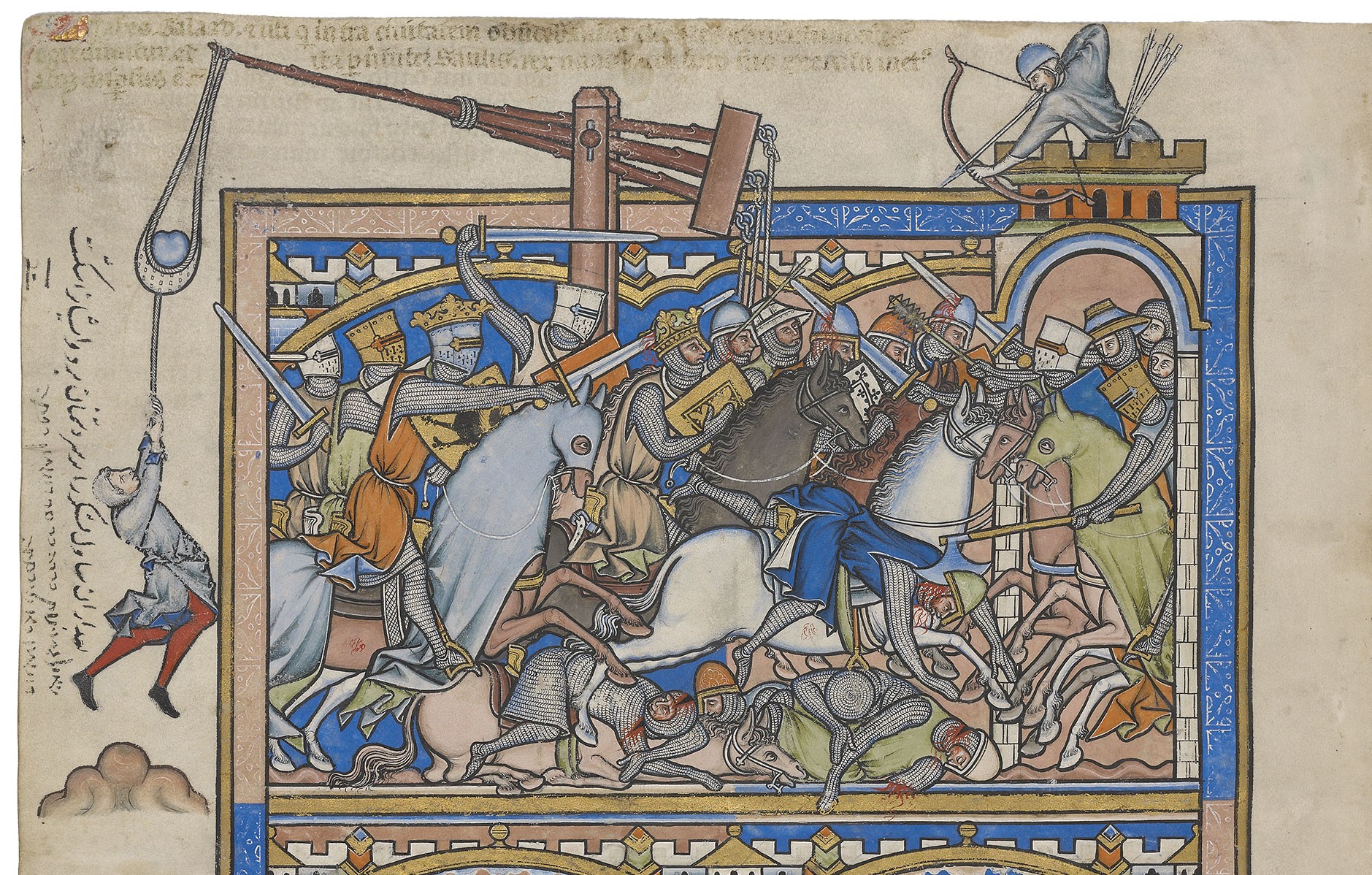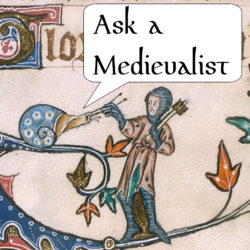Summary
“Wuv… twue wuv…will follow you fowever…”
Interested in a brief history of Valentine’s Day? You’re in luck. From the question of who was the historical saint to when the day became associated with romance, Em and Jesse start with ancient Roman fertility festivals like Lupercalia and trace the rituals forward through to references in Chaucer and Shakespeare. From cis to trans, straight to gay and everything in between, we have the info you’re interested in.
Annotations and Corrections
1/ Correction: you actually can use the frozen ganache in the center trick for chocolate-based chocolate lava cakes too. See this video and also this one that has both versions.
2/ St. Valentine, the 3rd century bishop. Interestingly, he is also the patron saint of the plague. And the island of Lesbos. [Lots of saints are patrons of plague (plague sufferers, that is). I think we’ve spent the past year learning why so many saints were needed in this specialty. St. Sebastian is among the most well known–his near death from arrows is probably the reason why he’s connected to plague. Apollo was the god of healing and plague, and he shot arrows at people/places to send plague. The connection between arrows and plague stuck around in early Christianity, and Sebastian is shot full of arrows. (Although this isn’t how he actually dies; he’s ultimately beaten to death). We talked about St. Sebastian in our plague episode–see episode 2, note 36.–Jesse]
This site has some information on the meanings of gemstones in the Medieval period, and so does this blog post from the British Museum. Also here.
Jesse: Medieval lapidaries (a lapidary is a book about the properties of stones and gems) were very common. If you’re looking for scholarly sources that will take you far more in-depth than the above websites, I recommend Katelyn Mesler’s article “The Medieval Lapidary of Techel/Azareus on Engraved Stones and Its Jewish Appropriations,” in Aleph 14.2. (2014): 75–143. The article is about the Jewish influence on a popular Christian lapidary, and it also has numerous great sources in the notes and citations.
3/ [11:30] “No one had come up with the idea of being tolerant of other religions…” Genghis Khan was apparently very tolerant of religious differences as long as you gave over enough loot. But he wouldn’t be around for almost another thousand years.
4/ Lupercalia (see the section “Name” for more on Februa.)
Monty Python: putting things on top of other things
The redemption of the firstborn is kind of discussed in a couple of places in the Torah and also in Jewish law–basically, if you have a son and you don’t want him to be a priest, you give five silver shekels to a kohen (priestly class–we’ve discussed this a little bit before). Interestingly (for my children at least), if the son is born by c-section, you don’t have to redeem them. I don’t know why. [Weird! –Jesse]
5/ Parlement of Foules, by Geoffrey Chaucer. (This website also references the Paston letters, as does the site referenced here: The Paston Letters.)
For this was on seynt Volantynys day
Whan euery bryd comyth there to chese his make
Of euery kynde that men thinke may
And that so heuge a noyse gan they make
That erthe & eyr & tre & euery lake
So ful was that onethe was there space
For me to stonde, so ful was al the place.”
In modern English:
For this was on Saint Valentine’s Day
When every bird comes there to choose his match
(Of every kind that men may think of!),
And that so huge a noise they began to make
That earth and air and tree and every lake
Was so full, that not easily was there space
For me to stand—so full was all the place.
6/ Charles, Duke of Orleans wrote the poem “A Farewell to Love” to his wife from his prison after being captured in the Battle of Agincourt. Charles was kept in England for about 25 years. The poem above was written to his second wife, who died before his return to France (his first wife had died in childbirth).
7/ From Hamlet, act IV, scene 5:
To-morrow is Saint Valentine’s day,
All in the morning betime,
And I a maid at your window,
To be your Valentine.
Then up he rose, and donn’d his clothes,
And dupp’d the chamber-door;
Let in the maid, that out a maid
Never departed more.
From A Midsummer Night’s Dream, act IV, scene 1:
Good morrow, friends. Saint Valentine is past:
Begin these wood-birds but to couple now?
7/ [27:30] What can I say? Dr. Jesse really likes penguins. [I do!!!!–Jesse]
Wisconsin is literally knee-deep in snow right now.
The book about the gay penguin couple is And Tango Makes Three, by Justin Richardson and Peter Parnell, with illustrations by Henry Cole. Also this: https://www.nbcnews.com/feature/nbc-out/gay-penguin-power-couple-fostering-second-egg-sydney-aquarium-n1077411
8/ [30:30] This is the article Dr. Jesse is referencing: “How Pandemics Wreak Havoc–and Open Minds,” by Lawrence Wright, from the July 13, 2020 issue of the New Yorker. Key quote:
Reading Cicero’s letters—or other abandoned works, like Livy’s history of Rome—revealed to Petrarch how degraded civilization had become. He christened the period after the fall of Rome the Dark Ages.
9/ [34:30] The Symposium. Em is wrong, Sappho does not appear in this dialog. [Socrates gives Diotima the credit for what he learned about love.–Jesse]
Sappho (c. 630-c. 570 BCE).
For more on Hedwig, Symposium, and Phaedrus see episode 7, note 10.
Hedwig and the Angry Inch / “The Origin of Love” Spotify link.
Lyrics.
Platonic Dialogue Phaedrus. There is a mention of Sappho here!
Pastoral. Good Wikipedia article, but it doesn’t discuss why pastoral poetry was so frequently coded as queer from the early modern period on.
[41:40] Full quote:
When a man’s verses cannot be understood, nor a
man’s good wit seconded with the forward child
Understanding, it strikes a man more dead than a
great reckoning in a little room. Truly, I would
the gods had made thee poetical.
As You Like It, act III, scene 3 (emphasis added)
10/ Brunetto Latini, episode 9, note 17 (really good, informative, long note!!).
11/ John Boswell, Same-Sex Unions in Premodern Europe, Villard Books, 1994, Amazon link, Wikipedia link.
John Boswell, Christianity, Social Tolerance, and Homosexuality: Gay People in Western Europe from the Beginning of the Christian Era to the Fourteenth Century, University of Chicago Press, 1980, Amazon link, Wikipedia link.
Boswell had a disagreement with Michel Foucault about homosexuality, in that Foucault basically saw identities (not behaviors) like “homosexual” and “heterosexual” as being socially constructed whereas Boswell saw them as basically a fact of human nature. They were apparently on good terms despite this disagreement. And then they both died of AIDS tragically young, Foucault in 1984 at age 57 and Boswell in 1994 at age 47. (Let’s all just take a moment and remember what a terrible person Ronald Regan was for his handling of that plague. Okay.)
12/ Jacqueline Murray, “Twice Marginal and Twice Invisible: Lesbians in the Middle Ages,” Handbook of Medieval Sexuality, ed. Vern L. Bullough and James A. Brundage. New York: Garland, 1996, 191–222. Link to full text.
13/ Hildegard: see episode 6 beginning around 34:00 and notes 17 and 23; episode 7, note 7.
Hadewijch: episode 7, notes 2 and 8.
Bieiris de Roman(s), first half of 13th century.
The last stanza of her canso reads as follows:
Bella doman, cui pretz e joi enansa
e gen parlar, a vos mas coblas man,
car en vos es gajess’ e alegranssa,
e tot lo ben qu’om en domna deman.Lovely woman, whom joy and noble speech uplift,
and merit, to you my stanzas go,
for in you are gaiety and happiness,
and all good things one could ask of a woman.
(See Wikipedia article for sources.)
14/ Jesse: Tiresias! In the Wikipedia article under the section “Blindness and Gift of Prophecy,” you can see the story of Tiresias being transformed into a woman after striking two snakes “coupling” (and after living 7 years as a woman striking 2 coupling snakes again–or maybe leaving them alone–and being transformed into a man). However, I’m not linking to this article because it states that Hera “punished” Tiresias for striking the snakes. 1) It’s not certain that Hera transformed him; the cause of the transformation is usually not only unclear but opaque. Hera may not show up in this story until the argument with Zeus over sexual pleasure. 2) ***Much more importantly,*** it’s not clear that it’s a punishment! There’s no judgement at all in most versions, although it sometimes seems implied that Tiresias had a sense that he would be transformed (at least in some way) and wanted to see what would happen. It could even be a form of reward. The article goes on to state that after 7 years Tiresias was “released from his sentence and permitted to regain his masculinity.” I don’t know who edited the article, but somebody needs to fix that sh*t. For all the frequent sexism of the ancient world, that is NOT what most versions say–the transformation is again usually described without judgement.
Brother Marinos: see episode 5, note 23.
Eleno / Elena de Céspedes. See also Israel Burshatin, “Written on the body: slave or Hermaphrodite in sixteenth-century Spain” in Queer Iberia: Sexualities, Cultures, and Crossings from the Middle Ages to the Renaissance (Durham: Duke University Press, 1999): 420–456.
Pope Joan (and also this Straight Dope article)–a MYTH! Everything about this is a misogynist myth! However, for more on a woman (NOT Joan) being portrayed as a pope (or more specifically as a tarot card “La Papessa”) see Barbara Newman, “The Heretic Saint: Guglielma of Bohemia, Milan, and Brunate,” in Church History 74.1 (March 2005): 1–38 (especially pages 28–30).
Podcast: Play in new window | Download

